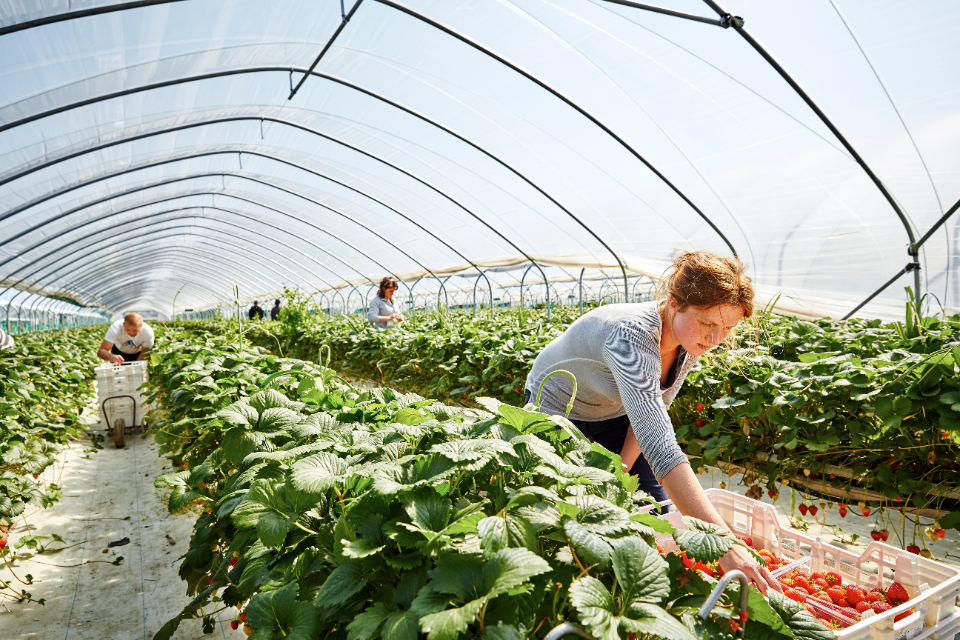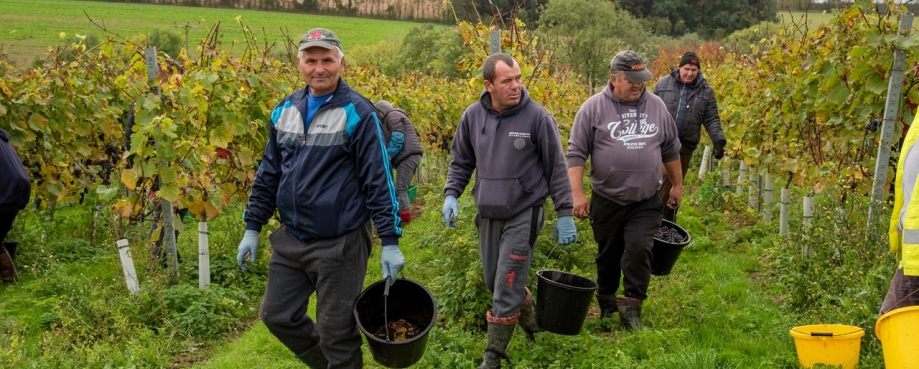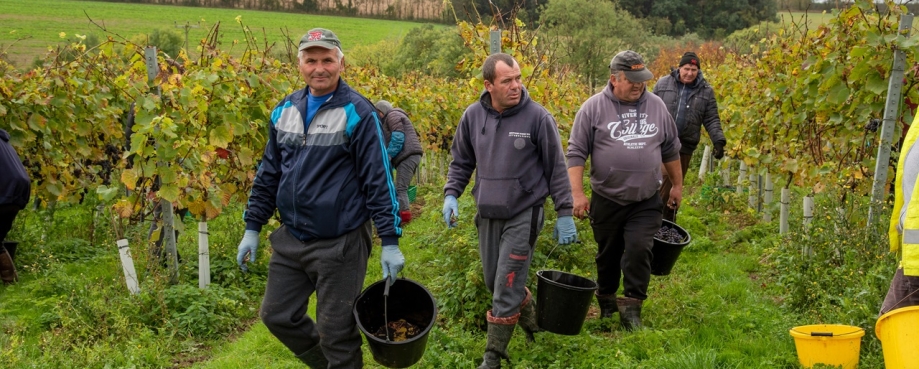9th May 2024: The Guardian – UK Government says employers may be required to pay travel and visa costs for people getting seasonal worker visas
Ministers within the UK government have some encouraging news for seasonal workers spending thousands of pounds to fly across the globe and pick Britain’s fruit.
Original Source: The Guardian by Emily Dugan – 9th May 2024
A Department for Environment and Rural Affairs paper published last night said the department is exploring introducing changes to the seasonal worker visa to ensure that employers pay for workers’ travel and visa costs.
Known as the “employer pays principle”, it would be a major concession since it would mean that anyone coming to work on British farms would not have to fork out the cost of flights and visas. Advocates for the policy say it better protects workers from being charged illegal fees, though there is industry concern that this cost is borne by supermarkets rather than already stretched farms.
The Guardian has previously revealed that Indonesian labourers picking berries on farms supplying major supermarkets were left up to £5,000 in debt to unlicensed foreign brokers for a single season of work in Britain.
The Defra paper, which also announces that the seasonal worker visa will be extended for another five years, says it has committed “to investigating the use of the employer pays principle for the seasonal worker visa route. Doing so would represent a significant step towards alleviating some of the financial burdens that workers can incur in paying for their visas and travel to the UK.”
It adds that it will now be seeking “evidence of the potential impacts across the supply chain, as well as on consumers and workers”.
The announcement follows the decision by the Supplier Ethical Data Exchange (Sedex) to require farming businesses to pay for the recruitment and transportation fees of the seasonal workers they employ. Sedex is a widely backed standard used by major UK supermarkets, who typically demand growers sign up to the scheme before their products are listed.
An open letter from organisations including the union the Landworkers’ Alliance has welcomed Sedex’s announcement but called for the cost to be borne by supermarkets rather than farmers “already struggling with financial pressures”. It argues that retailers “benefit from a greater proportion of the profits while shouldering less of the risk of production”.
9th May 2024: Landworker’s Alliance and Allies call for UK supermarkets to pay recruitment related fees and costs for migrant workers
Original Source: HERE

The statement is issued by the Landworkers’ Alliance (LWA), a union of agroecological farmers, growers, and land-based workers in the UK. LWA is affiliated to La Via Campesina, an international organisation of peasant and agricultural workers’ unions with two hundred million members in eighty-onecountries. This statement is also signed by Fair Square and Andy Hall, a migrant worker rights specialist.
See more: The Guardian 9th May 2024: UK Government says employers may be required to pay travel and visa costs for people getting seasonal worker visas
See more: 10th May 2024: Workers’ groups call on supermarkets to pay seasonal labour fees – The groups said there are risks farmers will be unable to comply to new rules
Vulnerable migrant workers from overseas pay often high levels of recruitment related fees and costs for their right to work, including for visa applications and travel. This causes several challenges for individuals recruited via the UK’s Seasonal Workers’ Scheme (SWS) in particular, and for migrants entering the UK under other immigration schemes.
These costs absorb a significant portion of worker wages. Workers pay these costs upfront before arriving in the UK.Research indicates that these workers often sell personal possessions or take on debt, often by taking out high interest rate loans to meet these recruitment related costs. This puts workers at high risk of modern slavery and then exploitationor vulnerability.
If no or infrequent work is available for migrant workers on arrival in the UK, whether due to climatic changes or other situations beyond the worker’s, employment intermediaries or employer’s control, such individuals cannot pay off their debt, which subsequently increases day by day. Such workers are then at risk of debt bondage, as they find themselves unable to leave an employer to earn enough to repay their debt with another employer or in another industry where work is more prevalent.
We also note that the payment of high levels of recruitment fees and costs, and issues of subsequent debt bondage, has significance well beyond the farming sector, affecting workers on Tier 2 visas in several other high-risk supply chains in the UK.
The requirement for SWS workers coming to the UK to meet many if not all of their recruitment related costs, and the limited monitoring of recruitment channels to detect unethical or irresponsible recruitment, marks the scheme out from similar visa systems in other countries where these costs are mostly or entirely met by employers or a combination of employers and the state. In the US, workers are not liable for any recruitment fees or related costs. In Australia and Canada, these costs are limited and shared with employers and the state.
Given the risks of forced labour resulting from payment by workers of high levels of recruitment related fees and costs, the International Labour Organisation (ILO) recommended in Guidelines published in 2019 that ‘No recruitment fees or related costs should be charged to, or otherwise borne by, workers or jobseekers.’ This is referred to as the Employer Pays Principle (EPP). Investors groups representing £800bn in assets have already called for retailers to take action to implement the EPP in across their supply chains.
In this regard, we welcome Sedex’s recent adoption of the EPP in their updated audit protocol utilised by much of the UK supermarkets’ supply chains as a means to promote and ensure compliance with standards on decent work and to prevent forced labour. We also note that these changes have significance beyond the UK, and will require these changes be implemented in supermarket supply chains internationally as well.
The UK Government has today also announced in its response to the 2023 Independent review into labour shortages in the food supply chain a commitment to investigating the use of the Employer Pays Principle for the Seasonal Worker visa route, and to fund economic modelling with the Seasonal Worker Taskforce – an industry-led taskforce focused on improving the welfare of migrant workers. We welcome this announcement but believe any such study should be conducted independently from the existing industry led taskforce and alongside civil society organisations, trade unions, and workers.
We recognise that implementing the EPP for Seasonal Workers in the UK will require a significant financial outlay at a time of great uncertainty for the UK farming sector. We believe, however, that it should be the supermarkets, not farmers, who pay these costs.
Fruit and vegetable farmers are already struggling with financial pressures and uncertainty created by extreme climate, with nearly half fearing they may go out of business within a year. There are risks farms will either be unable to comply with the EPP, or that complying will damage the economic viability of farm employers. To ensure the resilience of UK fresh produce supply, it is imperative that the costs of the SWS and the EPP are not put onto growers and farmers, but are paid by retailers, who benefit from a greater proportion of the profits while shouldering less of the risk of production.
It is worth noting also that supermarkets absorb the lion’s share of the value produced by farmers and workers. Research conducted by the New Economics Foundation in conjunction with the Landworkers’ Alliance found that 54.7% of the value of strawberries from a case study farm employing SWS workers went to the supermarket, while only 2.2% of the value went to farm as profit.
We note Sedex recognises that farms cannot implement the EPP alone. By categorising this requirement to implement the EPP as “Collaborative Action Required,” Sedexacknowledges the proposals will require wider supply chainsolutions.
Major British supermarkets have already publicly committed themselves to the implementation of the EPP in their supply chains. Many are already members of the Consumer Goods Forum (CGF), whose Priority Industry Principles on Forced Labour accepts the principle that no worker should pay for a job and no worker should be indebted or coerced to work.Tesco and Marks & Spencer are also members of the Leadership Group for Responsible Recruitment, which has committed to total eradication of recruitment fees and related costs being charged to workers by 2026.
For all of the reasons outlined above, we believe supermarkets must now therefore step up to meet the challenge of implementing the EPP in UK farming, and across other high risk immigration channels including the Tier 2 visa. Indeed, the implementation of the EPP should not stop in the UK. Supermarkets must also commit to implementing the EPP throughout their entire supply chains globally.
We the undersigned therefore call for UK supermarkets to meet the costs of implementing the EPP in the UK SWS, across the tier 2 visa scheme and across their global supply chains.
We ask that the UK’s supermarkets, in conjunction with farmers and other suppliers, workers and trade unions, investors and civil society organisations, all work in partnership, including with the UK government, to swiftly develop a solution for sustainably implementing the EPP in the UK produce sector, across all immigration channels into the UK where workers are migrating for work, and in their global supply chains.
Together we can ensure that no worker on a UK farm or in UK supermarket supply chains has to pay for their job, no vulnerable migrant workers live in debt bondage, and enable ajust and fair food production system and supply chain for both suppliers, farmers and workers.
Signed by: Catherine McAndrew, Landworkers’ Alliance, Fair Square and Andy Hall, Migrant Worker Rights Specialist
10th May 2024: ETI – New commitments announced under the UK Seasonal Agricultural Workers Scheme
Original Source: Ethical Trading Initiative by Cara Casey-Boyce – 10th May 2024

This week the UK government responded to an Independent Review into labour shortages in the food supply chain, announcing several new commitments, among them is a five-year extension of the Seasonal Agriculture Workers Scheme (SAWS) and an investigation into the use of the ‘Employer Pays Principle’.
The SAWS enables individuals to come to the UK and work in the horticulture and poultry production sectors. The scheme relies on those who choose to migrate to pay their own way to UK shores, resulting in too many cases where migrant workers arrive via the SAWS in significant debt, vulnerable to further exploitation and unable to access enough work during their stay to settle debts or earn a profit.
Although this is not true for all who migrate via the SAWS, too many workers continue to face this fate. While an extension of the scheme is important to give growers and others some sense of continuation while other commitments are put in place, this alone is not enough. More needs to be done to ensure the costs migrant workers incur to bring food to UK and European markets, are shared along the value chain.
ETI welcomes the government’s decision to open the door for much needed improvements, as stated in their response:
“The government remains open to making improvements to the visa route throughout its 5-year extension and will explore the feasibility of potential improvements in due course.”
“In committing to the extension of the Seasonal Worker visa route the government will remain unwavering in its commitment to reduce the risks of labour exploitation and modern slavery”
“This includes our commitment to investigating the use of the Employer Pays Principle for the Seasonal Worker visa route.”
ETI Director Peter McAllister says “There is an urgent need for improvements in the scheme, that includes the reduction of risks of labour exploitation and modern slavery, and the Employer Pays Principle. Workers should not arrive in the UK already in debt and without a guarantee of being able to make a profit. ETI will continue to work with others to ensure these changes are put in place in way that is fair and sustainable.”
Additional Reading:
Guardian 9th May 2024: UK Government says employers may be required to pay travel and visa costs for people getting seasonal worker visas
GROCER 10th May 2024: SOURCING Workers’ groups call on supermarkets to pay seasonal labour fees – The groups said there are risks farmers will be unable to comply to new rules
April 30th 2024: BBC World – England again employs seasonal fruit pickers from Indonesia (translation)
The Grocer 30th Apr 2024: Growers brace for up to £90m in additional seasonal worker costs in UK in move towards internationally compliant zero cost responsible recruitment model for vulnerable migrant workers
3rd April 2024: Financial Times (London) UK employment – Britain’s seasonal worker scheme leaves many migrants in debt, research finds
3rd April 2024: Independent – Migrant fruit pickers saddled with debts of up to £5,500 to come to UK through government scheme
26th January 2024: UK Seasonal Worker Scheme Modern Slavery Issues: Indonesian seasonal fruit pickers landed in debt bondage challenges Home Office
26th Jan 2024: ATLEU – UK government fails to protect workers from trafficking and exploitation
26th Jan 2024: ATLEU – Challenge to government’s Seasonal Worker Scheme
25th Jan 2024 Home Office: UK government survey on experiences of seasonal workers scheme confirms the exceptionally high levels of issues (confusion, fees etc) faced by Indonesian and Nepali workers in 2021/2022
24th Jan 2024: ATLEU – Seasonal worker recognised as a potential victim of trafficking
12th January 2024: UK government ‘breaching international law’ with seasonal worker scheme, says UN envoy
FLEX 6th Nov 2023 – FLEX on the House of Lords Horticultural Committee report
FLEX 26th Oct 2023 – Seasonal Workers’ Rights; Who’s Responsible?
21st July 2023: Vulnerable UK migrant workers at risk as audits of farm recruiters stall
17th March 2023 BHRRC Blog Series: UK Seasonal Worker Scheme Endangers Vulnerable Foreign Workers. (My Op Ed)
23rd February 2023: Farm workers on UK seasonal visas to be guaranteed 32 hours a week
Other stories on challenges of UK seasonal worker scheme:
1. Working in the UK: Hundreds of Indonesian Citizens Escape, More Than 1,200 Workers from Indonesia Threatened to Cancel (BBC, 16th Feb 2023)
2. AG Recruitment, UK recruiter of debt-hit Indonesian and Nepali migrant workers, loses seasonal workers scheme license following forced labour related allegations, worker abscondments and asylum claims (Guardian, 10th Feb 2023)
3. Indonesian former fruit pickers become illegal immigrants and asylum seekers in the UK – ‘This is the easiest shortcut’ (BBC, 26th Jan 2023)
4. Home Office accepts recommendations in Chief Inspector’s report on immigration system as it relates to the agricultural sector (Freeths, 16th Jan 2023)
5. Immigration: Investors warn food companies about risk of forced labour on UK farms (Financial Times 19th Dec 2022)
6. Investor statement on the UK Seasonal Worker Scheme (Public Investor Statement 19th Dec 2022)
7. Hundreds of Indonesian fruit pickers in UK seek diplomatic help (Guardian, 2nd Dec 2022)
8. Seasonal worker visa puts migrants at risk of exploitation, say supermarkets (Guardian, 2nd Dec 2022)
9. Seasonal fruit pickers from Nepal left thousands in debt after being sent home early from UK farms (Guardian, 13th Nov 2022)
10. Indonesia to investigate claims fruit pickers in UK seasonal agricultural workers scheme charged thousands to work in Kent (Guardian, 29th Aug 2022)


